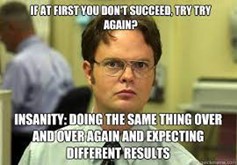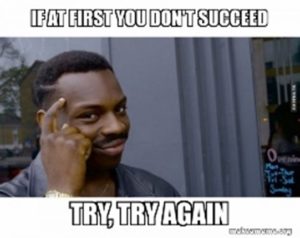Are you battling with a task? If someone says, "if at first, you don't succeed, try, try, again," what do they mean? This post unpacks everything you need to know about the meaning and origin of this expression.
Meaning
The proverb's meaning, "if at first, you don't succeed, try, try, again," is never to give up. It's a motivating phrase that inspires people to keep taking action despite receiving poor results. Typically, you'll use the term to motivate someone when you know that they have the skills and talent to complete the task eventually.
For instance, if you're building a house of cards, they might fall as you get to the top deck. You keep trying but keep failing on the top deck. A friend tells you, "if at first, you don't succeed, try, try, again." They are insinuating that you are close to making it happen, and if you keep trying, you will eventually experience success.
Example Usage
Jan: "I just can't seem to get this right. No matter how many times I try, it just comes out wrong."
Kim: "You know what they say, If at first, you don't succeed, try, try, again. Keep going, and you'll get there eventually. It's just a matter of time before the results show up."
---
Felecia: "I'm struggling with passing my driver's license. I've failed four times now, and I'm not sure if I'm going to make it this time. Why bother trying again?"
Deb: "Well, if at first, you don't succeed, try, try, again. Eventually, you'll get it right, and all the effort will be worth it, right?"


Origin
The origin of the expression, "if at first, you don't succeed, try, try again," comes from "Robert the Bruce," the first king of Scotland. The recording of his experiences after going into hiding from the British during his rule describes him watching a spider's repeated attempts to build a web and fail.
Robert the Bruce would say that this was nature's way of telling him to persist in his fight against the English. However, the first written record of the proverb comes from American educator Thomas H Palmer, in his teacher's manual published in 1840. In the book, Palmer says the following.
'Tis a lesson you should heed, Try, try again.
If at first, you don't succeed, Try, try again.
Edward Hickson would popularize the proverb in his book, "The Singing Master."
Phrases Similar to If at First, You Don't Succeed Try Try Again
- Whatever it takes.
- Never give up.
Phrases Opposite to If at First, You Don't Succeed Try Try Again
- Why bother?
- Why take the effort?
What is the Correct Saying?
- If at first, you don't succeed, try, try, again.
- If, at first, you don't succeed, try again.
Ways People May Say If, at First, You Don't Succeed Try Try Again Incorrectly
You wouldn't use the expression "if at first, you don't succeed, try, try, again" when someone fails at doing a life-threatening or dangerous task. For instance, if a daredevil misses a car jump and crashes, nearly taking his life, the use of the saying would be rather inappropriate.
Acceptable Ways to Phrase If at First, You Don't Succeed Try Try Again
You can use the expression "if at first, you don't succeed, try, try, again." When you're trying to give someone hope to achieve their goals.
"If at first, you don't succeed, try, try, again" is a way of helping them maintain their self-confidence in a moment where they feel like they want to give up.